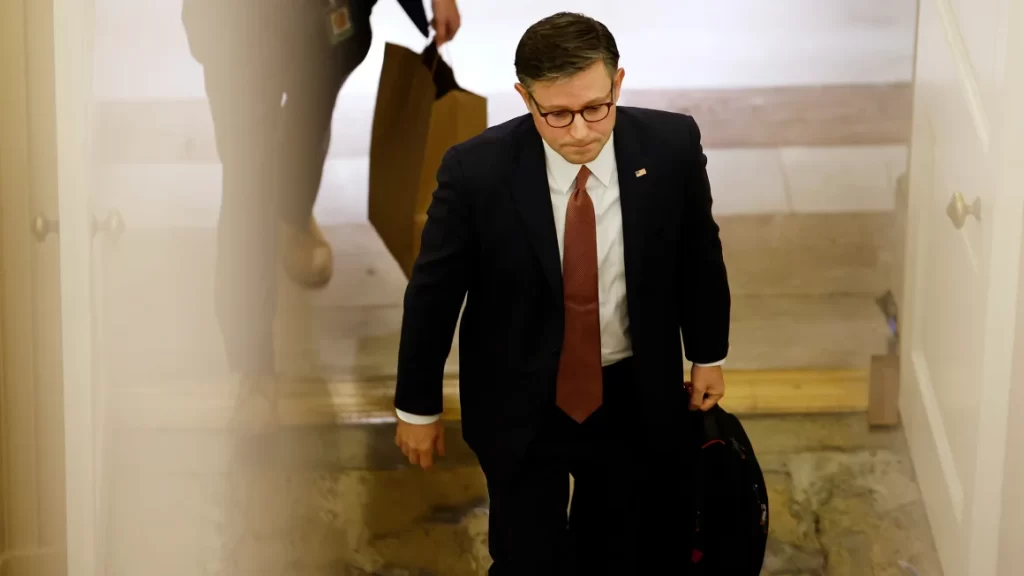
On Wednesday evening, House Republican leaders unveiled a new agreement to raise the threshold required for invoking a motion to vacate the speaker’s chair. Under the current rule, just one member of Congress can initiate a vote of no confidence against the Speaker. The new agreement increases this threshold to nine members, signaling a shift in how future leadership challenges will be handled.
The motion to vacate rule became a key point of contention during the ousting of Speaker Kevin McCarthy in October 2023. At that time, McCarthy faced significant pressure from conservative members, particularly from the House Freedom Caucus, who used the motion to remove him from office. In an effort to stabilize the House GOP and prevent similar challenges to Speaker Mike Johnson’s leadership, discussions were held among various factions, including the conservative House Freedom Caucus and the more moderate Main Street Caucus. These talks, led by Speaker Johnson, aimed at reaching a compromise on the motion to vacate and other internal party rules.
The new rule change, which is expected to be approved by the House GOP conference on Thursday, would make it more difficult for any individual member to disrupt the speaker’s position. By raising the threshold to nine members, it reduces the likelihood that a small group of discontented lawmakers could initiate a vote to remove the speaker. This change is seen as a way to bolster Johnson’s leadership, especially as the Republican Party is projected to retain control of the House in the next Congress.
Rep. Andy Harris of Maryland, a key member of the House Freedom Caucus, expressed his support for the agreement, stating that it would help eliminate divisive issues within the party. Harris emphasized that the new rule change would help Republicans focus on advancing President Donald Trump’s agenda, which he argued was the primary expectation of voters. “We know who our speaker is, and we’ve been able to work across the conference to remove the controversial issues that could divide us,” Harris said. He framed the agreement as a concrete step toward fulfilling the Republican Party’s promises to the American people.
Rep. Dusty Johnson, a member of the more centrist Main Street Caucus, also supported the change, explaining that it would reduce the likelihood of internal GOP conflicts. According to Johnson, the agreement would help remove amendments and procedural changes that could have caused divisions within the conference. “We had an opportunity to set the motion to vacate at a higher threshold, and in return, we’re getting rid of amendments that could have split the conference,” Johnson explained.
The motion to vacate is a rarely used procedural tool in Congress. In fact, McCarthy is the only speaker in modern history to have been removed through such a vote. However, the threat of a motion to vacate has proven to be a powerful leverage point for factions within the party. For McCarthy, the possibility of being ousted was a constant source of tension, especially as he struggled to satisfy the demands of both conservative and moderate Republicans. To secure the speaker’s gavel, McCarthy had agreed to a number of concessions, including reinstating the ability for any individual member to introduce a motion to vacate.
In October 2023, McCarthy’s leadership was ultimately brought down by a motion to vacate, following a series of internal GOP struggles. After McCarthy’s ousting, the House GOP spent several weeks in disarray before electing Mike Johnson as the new speaker. Johnson, who had been elected as a consensus candidate, has worked to navigate the divided GOP conference and implement changes aimed at promoting party unity.
The motion to vacate rule change is one of several internal GOP reforms designed to ensure stability under Speaker Johnson’s leadership. While it is still unclear how the new rule will impact the dynamics of the House, it is clear that the change is intended to reduce the risk of a repeat of McCarthy’s downfall and to create a more unified GOP leadership structure moving forward.
As the new rule package progresses through the House GOP conference, its impact will be closely watched, as it could influence both the party’s internal cohesion and its ability to govern effectively in the coming years. By raising the threshold for a motion to vacate, Republicans aim to strengthen Speaker Johnson’s position and focus on achieving their legislative agenda.








